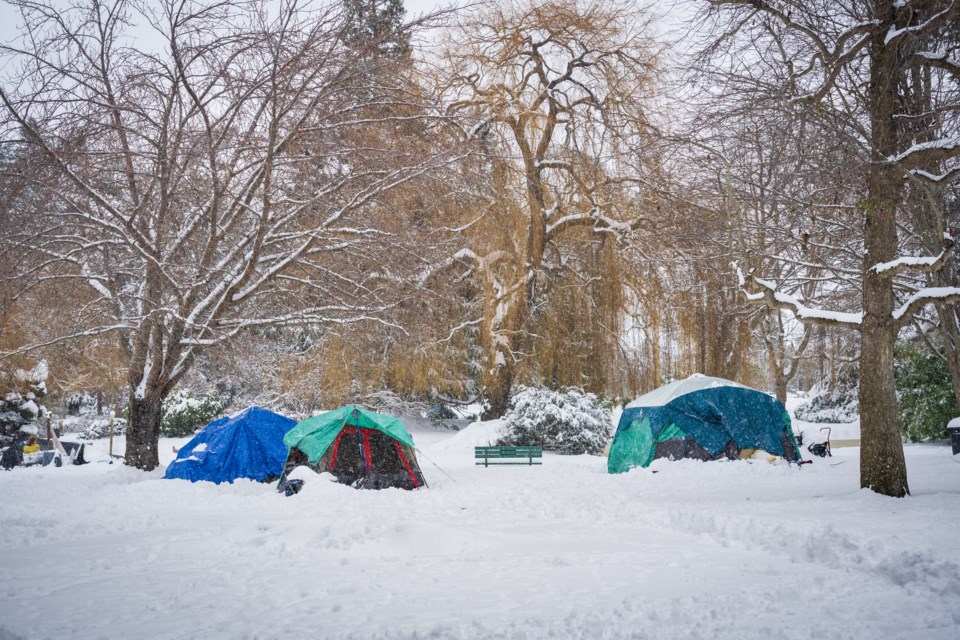For years, the unhoused community have been setting up tents in various locations throughout municipalities in B.C., with the city, bylaw, and police enforcing street and traffic regulations displacing the homeless with a lack of sustainable housing options available.
According to Nikki Otteson, founder of the Backpack Project, Victoria’s Princess Avenue, in front of Rock Bay shelter, and Pandora Avenue are places that are swept regularly.
“We get a lot of text messages and messages on social media, asking for tents and sleeping bags and clothing again,” said Otteson when reflecting on the aftermath of a sweep. “We hear lots of stories about what bylaw has taken and what they've thrown in the garbage. A lot of it is sentimental.”
When the spaces that unhoused people gathered in are swept, Otteson said “the first [thing] it does is it breaks up community and it breaks up safety.”
“When you’re scattered, you’re on your own again,” she said. “We're not only isolating them from the housed community, we're isolating them from their own communities.”
QomQem Coastal Connections is an Indigenous-led outreach program that supports Victoria’s unhoused, substance users, or those who have insecure and temporary housing.
“The folks that we are supporting are often displaced or disconnected from family and community,” shared Lacey Jones, an outreach worker with QomQem Coastal Connections. “I think being able to offer Indigenous-led services that are grounded in culture and offering that reconnection back to our relatives on the street is really imperative for their wellness.”
Jones shared that a few years ago, when the encampments had been prominent throughout Victoria, QomQem Coastal started to bring drumming to the unhoused.
“There was a Nuu-chah-nulth women’s dance group that came, and they brought their shawls and paddles,” she said.
Guy and Calvin Louie, alongside Pete Charlie, drummed Nuu-chah-nulth songs, inviting Indigenous folks from the encampment to dance with them.
Jones reflected on the experience of an individual she had been working closely with. She shared with Jones that after having danced, she had the “best sleep she’d had in years,” even though she was outside in a tent.
“That was the first time she got up and danced in years,” said Jones.
“A long time ago our laws always stated that we always had a home in our community, we always had enough to eat,” shared Jones. “Looking at the sweeps and all these other things that are happening to Indigenous folks especially, goes directly against our inherent rights as Indigenous people to have a place to call home to have food to eat.”
She notes that bylaw enforcement of the homeless has “underpinnings of colonial society always telling us how to live and what we can keep…when they take down your tent, they'll decide what they'll throw away.”
“We have to go back to the idea of land being used as a way to generate wealth for some people, some individuals, and at the expense of others,” said Angela MacDougall, executive director at Battered Women's Support Services. “One of the major problems is that there's been an absolute divestment from this idea of housing being a necessity for people.”
Additionally, MacDougall notes that the lack of mental health services and substance-use treatment centers are significant issues when it comes to homelessness.
“Here we are now where we have encampments and we have encampments with people that can’t access housing, that are struggling with substance-use as a result of trauma… [and] are being poisoned by the drug supply,” she said. “People are congregating as a result of all these things.”
Due to ‘safety concerns,’ in early April, the City of Vancouver, and Vancouver Police Department (VPD) worked to shut down an illegal encampment on East Hastings, enforcing the Streets and Traffic Bylaw alongside the Vancouver Fire chief order to remove tent structures. Their primary concerns were for public safety and fire hazards, with more than 400 fires occurring in the eight months prior.
Though they worked to close the encampment in early April, some tents remain, said MacDougall.
“There's tents still here because there’s nowhere for people to go,” she said.
She explains that shelters are an emergency response and shouldn’t be positioned as “the housing option” for unhoused people.
“I would hope that we could, as a society, want to build options that don’t involve people living on the street, in a tent,” said MacDougall.



